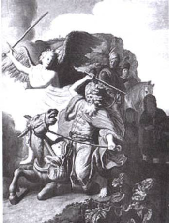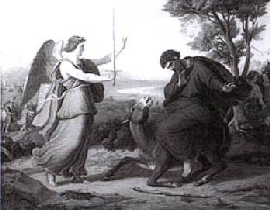A Journey through the Bible with Tiglath
26. Numbers Chapter 20 verse 14 to Chapter 24 verse 25.
The Israelites are now wishing to move on from Kadesh where they received
the water from the rock, and where Miriam died and was buried, At this point
Moses wished to lead the Israelites through the land of the Edomites - this
gave a direct approach to the Promised Land. Verses 14 to 21 tell what
happened when the Edomites refused to allow the Israelites into their country,
although they promised to pass through in peace. Near the frontier of Edom
was Mount Hor. Moses was instructed by God to take Aaron and Aaron's son
Eleazar to the top of the mountain. There Moses divested Aaron of his priestly
robes and invested his son with them. Aaron died on the top of Mount Hor. He
was not allowed to reach the Holy Land because he and Moses had rebelled
against God over the waters of Meribah.
Chapter 21 begins with the destruction of the Canaanites when they attacked
the Israelites (verses 1-3). At this point the people began to complain of the
conditions in the desert and asked why they had be brought out of Egypt. The
Lord sent a plague of poisonous snakes among the people so that many them
died (verse 6). The people pleaded with Moses to ask God to get rid of the
snakes. God told Moses to make a bronze serpent as a standard. Anyone bitten
by a snake had only to look at it and they would recover (verses 8 and 9). The
remainder of Chapter describes how the Israelites fought various tribes on the
way to the Promised Land.
Chapter 22 finds the Israelites encamped on the lowlands of Moab. They were
a large body of people and terrified the Moabites. Balak. the king of Moab,
sent for Balaam, a kind of mercenary prophet who lived by the Euphrates and
asked him to denounce the Israelites, Balaam consulted God and was told to
do no such thing but go back to his own country.
Again Balak sent for Balaam and
again Balaam consulted God who
told him to go with the Moabite
chiefs but only to do what God tells
him to do. Here the story becomes
confusing because verse 22 tells us
that God was angry because
Balaam went with the Moabites.
Verses 23 to 35 tell the wonderful
story of Balaam's ass. She saw
what Balaam could not see — an
angel with a flaming sword
blocking his way. Three times she
turned off the track. The first time
she did this Balaam beat her. The
second time she turned and crushed
Balaam's foot against a wall. Again
he beat her. The third time the ass
lay down and Balaam again gave
her a good hiding. At this point the
ass spoke and asked Balsam what
on earth he was doing. Balaam told
the ass that if he had been carrying
a sword he would have killed her.
At this point Balaam's eyes were
opened and he saw the angel. He at
once prostrated himself on the ground and said how sorry he was. He was told, in no
uncertain terms, that if he hadn't stopped he would have been killed and the ass
spared (verses 23 - 34). Balaam was then instructed to go on with the Moabites.
When Balak heard that Balaam was coming he went to meet him. Again Balaam
tells Balak that he can only obey the words of God. Balak and Balaam go to a high
place where they can see the Israelites. Balaam instructs Balak to build seven altars
and offer a bull and a ram on each. Balak is then instructed to stand by the altars
while he, Balaam walks away, on his own, in case the Lord speaks to him. In verses
7 to 10 we discover what God instructs Balaam to say to Balak. In this oracle, far
from denouncing the Israelites, he praises them. When Balak remonstrates with
him Balaam again says that he must say the words that God tells him. In verses 13
to 30 Balak again attempts to get Balaam to denounce the Israelites. Again, Balaam
consults God, and in verses 14 — 24 he utters another oracle in favour of the
Israelites. In Chapter 24 there are two more oracles from Balsam, under God's
guidance, in favour of the Israelites. By verse 25 both Balaam and Balak must have
been fed up with each other and they parted. As I wrote earlier, it is interesting to
discover that Balsam was a mercenary soothsayer who was paid for the oracles he uttered.
Next month we describe some very strange behaviour of the Israelite women!
The Prophet Balaam and the Ass,
by Rembrandt van Rijn, 1626


Balaam and the angel, Gustav Jaeger